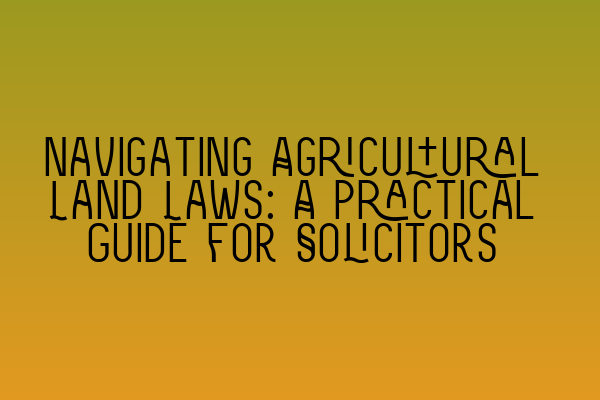Welcome to SQE Property Law & Land Law, where our team of experienced solicitors is here to provide you with invaluable guidance on navigating the complexities of agricultural land laws. In this practical guide, we will explore the key considerations and legal frameworks that solicitors need to be familiar with when dealing with agricultural land transactions. Whether you are a seasoned solicitor or new to the field, this guide will equip you with the knowledge necessary to confidently navigate agricultural land laws on behalf of your clients.
Understanding Agricultural Land Laws
Agricultural land laws encompass regulations and legal principles that govern the sale, purchase, lease, and use of land primarily for agricultural purposes. These laws aim to protect the interests of farmers, agricultural businesses, and the environment. The interpretation and application of these laws can vary across jurisdictions and may involve considerations of property rights, planning and zoning, environmental regulations, and more.
It is vital for solicitors to have a comprehensive understanding of the legal framework surrounding agricultural land to effectively advise clients and facilitate lawful transactions. To achieve this, solicitors must stay up-to-date with relevant legislations, case law, and industry developments. Familiarity with key statutes, such as the Agricultural Holdings Act 1986 and the Common Agricultural Policy, is essential for providing accurate and reliable advice to agricultural landowners and stakeholders.
The Role of Solicitors in Agricultural Land Transactions
In agricultural land transactions, solicitors play a crucial role in ensuring compliance with legal obligations, protecting their clients’ interests, and facilitating smooth transactions. Here are some key areas where solicitors need to focus:
Due Diligence and Title Searches
Thorough due diligence is fundamental to any agricultural land transaction. Solicitors must conduct comprehensive searches and investigations to verify the ownership, boundaries, restrictions, and any potential encumbrances associated with the land. This includes examining title deeds, land registry records, environmental reports, and planning permissions. Conducting due diligence early in the transaction process can uncover any issues or risks that may arise and provide an opportunity to mitigate them.
For more information on conducting due diligence, refer to our article on SQE 1 Practice Exam Questions.
Drafting and Negotiating Contracts
Once due diligence is complete, solicitors must draft and negotiate the necessary legal documents to formalize the transaction. Contracts for the sale, lease, or tenancy of agricultural land should be carefully tailored to meet the specific needs and objectives of both parties while ensuring compliance with legal requirements. Solicitors must pay close attention to important clauses, such as rent reviews, repair obligations, and termination rights.
For practical guidance on contract drafting and negotiation, our article on SQE 1 Practice Mocks FLK1 FLK2 offers valuable insights.
Land Use and Environmental Regulations
Agricultural land use is subject to various regulations aimed at protecting the environment, maintaining sustainable farming practices, and preserving the countryside. Solicitors must advise clients on complying with these regulations by obtaining necessary permits, consents, and licenses related to land use, waste management, water resources, and other relevant aspects.
If disputes arise concerning environmental compliance or breaches of land use regulations, solicitors should be well-versed in resolving such conflicts through negotiation, mediation, or litigation.
Special Considerations in Agricultural Land Laws
In addition to the general principles of property and land law, solicitors dealing with agricultural land must also navigate specific considerations that are unique to this sector. Here are a few areas that require special attention:
Agricultural Tenancies and Leases
Agricultural tenancies and leases involve specific legal frameworks that protect the rights of agricultural tenants while balancing the interests of landowners. Solicitors must be aware of the intricacies of agricultural tenancy legislation and advise clients on matters such as secure tenancies, succession rights, rent reviews, and termination procedures.
Our SQE 2 Preparation Courses provide in-depth coverage of agricultural tenancies and leases.
Subsidies and Rural Payments
The agricultural sector benefits from various subsidy schemes and rural payment programs. Solicitors should have a sound understanding of the eligibility requirements, application processes, and the legal implications of these financial assistance programs. They must advise clients on maximizing their entitlements while ensuring compliance with program regulations.
Agricultural Restrictive Covenants
Agricultural restrictive covenants can impose obligations or restrictions on the use of land, either to protect farmland or restrict certain activities. Solicitors need to assess the enforceability and implications of such covenants and advise their clients accordingly.
If you need further information on restrictive covenants, our SQE 1 Preparation Courses offer comprehensive insights.
Conclusion
Navigating agricultural land laws can be complex, but with the right knowledge and resources, solicitors can confidently guide their clients through agricultural land transactions. By conducting thorough due diligence, understanding the nuances of agricultural tenancies and leases, and staying informed about environmental regulations, solicitors can effectively protect their clients’ interests and facilitate successful transactions.
At SQE Property Law & Land Law, our team of experienced solicitors is here to assist you every step of the way. Contact us today to benefit from our expertise in agricultural land laws and ensure your clients receive the best possible legal representation.
For more information on upcoming SRA SQE exam dates and preparation, visit our article on SRA SQE Exam Dates.
